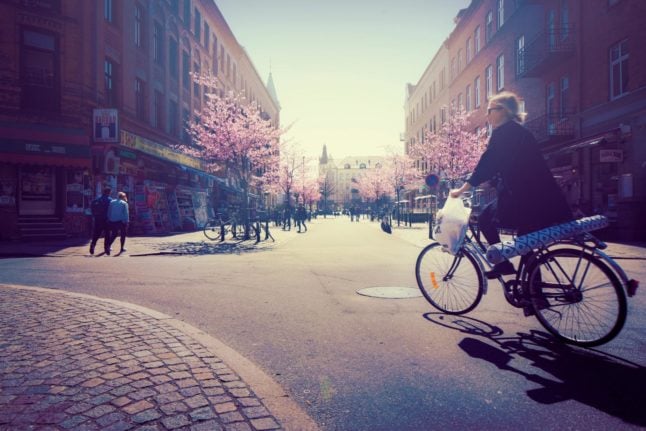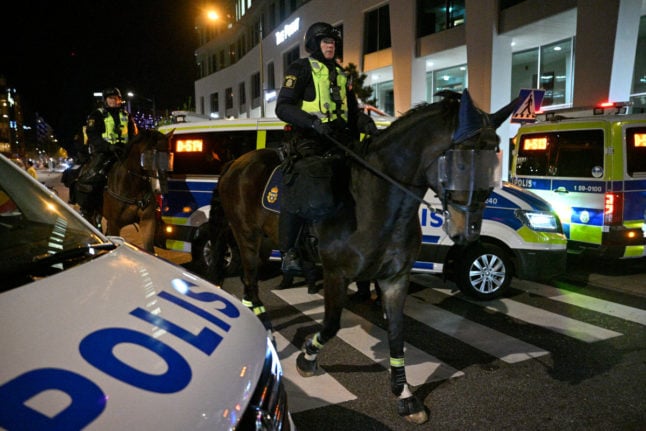How do I get around?
Cycling is by far the easiest way to get around Malmö, and cycling around the city on a sunny day is a great way to get to know the city. Malmö is very flat and with over 500 kilometres of bike paths criss-crossing the city, you’re often able to get to your destination faster by bike than by car or public transport.
If you’ve booked a hotel, you might be able to borrow a bike from the lobby, otherwise you can rent one from the city’s Malmö by Bike service – it costs 80 kronor for 24 hours, 165 kronor for 72 hours or 250 kronor for a full year.
Coming over from Copenhagen? You can even buy a bike ticket and bring it over with you on the train.
Can’t cycle or just don’t fancy it? Local transport company Skånetrafiken has launched a special eight day ticket for May 5th-12th, costing 350 kronor for all of Skåne (the region Malmö is in) or 700 kronor for Skåne and Copenhagen, and covering buses and trains. That’s available on their Skånetrafiken app (Google Play or Apple) until May 12th.
You can also buy single bus or train tickets within Malmö for 31 kronor in the app, online or by tapping your payment card on the city’s buses. Two people travelling together get a 25 percent discount if you buy in the app, online or from a ticket machine.
What is there to see and do in Malmö?
Coming to Malmö as a tourist, it’s easy to be underwhelmed, especially if you don’t stray from the main shopping street.
It’s a small city, relatively speaking, but that doesn’t mean there’s nothing to do.
In terms of tourist sights, there are a few museums. Malmö Museum is southern Sweden’s largest museum, although it’s technically three museums in one: Malmöhus castle, which was built back when Skåne was part of Denmark, the Malmö Konstmuseum art museum, and the technology and maritime museum Teknikens- och sjöfartens hus.
Tickets are also relatively cheap: 100 kronor for adults if you want to visit all three museums, or 60 kronor if you only want to visit one (the castle and art museum are in the same building, so a single 60 kronor ticket grants you access to both). Under-19s go free.
Malmö is also home to art gallery Malmö Konsthall, which has free entry, as well as an interactive workshop with activities for kids. The gallery houses restaurant Smak, which offers modern New Nordic-style lunches for around 160 kronor. Don’t get this confused with Moderna Museet, the city’s modern art gallery. This is also worth a visit, but be aware that you’ll have to buy a ticket – although having said that they’re only 50 kronor for adults. They also have a café which serves Danish-style smørrebrød.
There is also be an Abba museum in the city until May 13th, where fans can celebrate the 50 year anniversary of the band winning the contest with Waterloo.
What about food?
The best thing to do in Malmö, however, is to just eat your way around the city. There are people from over 180 different nationalities living in Malmö, which is reflected in the food scene.
Fancy authentic Sichuan food? Try Kina Restaurang Sichuan on Amiralsgatan (order off the Sichuan section of their á la carte menu). Ethiopian or Eritrean food? Zula or Enjera on Ystadsgatan. British pies? Marvin near Davidshall. You get the picture – just go for a wander around the Möllevången neighbourhood (head east from Triangeln station) and you should find somewhere good and reasonably priced.
There are also more upmarket restaurants in Malmö if that’s more what you fancy – there are some suggestions in this article.
Looking for somewhere to go for a drink? Here’s a list of some budget-friendly bars, and here are a few craft beer spots (which have pretty good food, too). The city’s also home to some great wine bars and cocktail bars. We even have great coffee – Lilla Kafferosteriet and Solde both roast their own beans.
You don’t have to go far to find interesting neighbourhoods in Malmö, just venture slightly outside the centre, away from Lilla Torg and the main shopping streets, Södergatan and Södra Förstadsgatan. Try Davidshall for good food and interesting shops, Möllevången (also known as Möllan) for bars, restaurants and nightlife, or why not head down to the beach at Ribersborg?



 Please whitelist us to continue reading.
Please whitelist us to continue reading.
Member comments